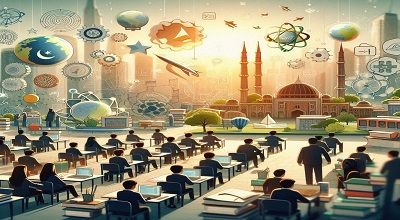Secondary Education
In Pakistan, secondary education typically refers to the educational level. That follows primary education and is designed for students aged 11 to 16. Secondary edu is a crucial stage in a student’s academic journey. As it lays the foundation for higher education and vocational training. Here are some key points about secondary edu in Pakistan:
- Age Group: Secondary education in Pakistan is generally for students aged 11 to 16. Covering grades 6 to 10 or 7 to 11, depending on the specific educational system or board.
- Curriculum: The curriculum in Pakistan’s secondary education system typically includes subjects. Such as Mathematics, Science, Social Studies, English, Urdu. Or a regional language, and additional elective subjects depending on the student’s choice or the school’s offerings. The curriculum may vary slightly between different educational boards. Such as the Federal Board of Intermediate and Secondary Education (FBISE). Provincial boards, and international boards like the Cambridge system.
- Examinations: Students in secondary education usually prepare for their Secondary School Certificate (SSC) or equivalent examinations. Which are conducted by the respective educational boards. These examinations are critical as they determine a student’s eligibility for further education.
- Matriculation: The successful completion of secondary education in Pakistan leads to obtaining the Matriculation certificate. Which is equivalent to the 10th-grade certificate in many other countries. This certificate is required for admission to intermediate or higher secondary education.
More Here
- Choice of Educational Pathways: After completing secondary edu, students in Pakistan have the option to pursue various pathways. They can choose to continue their education in an intermediate college or higher secondary school. Where they typically study for two additional years (grades 11 and 12). Alternatively, students can opt for vocational or technical education if they wish to acquire specific skills for employment.
- Role of Federal and Provincial Education Boards: Pakistan has both federal and provincial education boards. Each is responsible for regulating and conducting examinations for schools within its jurisdiction. The curriculum and examination processes may vary slightly between these boards.
- Access and Challenges: Pakistan has made efforts to improve access to secondary education in recent years. There are still significant challenges. Including issues related to gender disparities, quality of education, and infrastructure in many areas.
It’s important to note that the education system in Pakistan is continually evolving. And policies and practices may change over time. Additionally, there may be variations in the education system between different provinces within Pakistan.
Importance Of Secondary Education
Secondary education holds significant importance for several reasons. Both for individuals and society as a whole. Here are some key reasons why secondary education is important:
- Foundation for Higher Education: Secondary edu serves as a crucial foundation for higher education. It provides students with the knowledge and skills necessary to pursue further studies. Whether in universities, colleges, or vocational institutions.
- Preparation for Employment: Secondary education equips students with practical skills and knowledge that are essential for entering the workforce. It can prepare them for a wide range of career options, including technical and vocational fields.
- Critical Thinking and Problem-Solving: Secondary edu promotes critical thinking and problem-solving skills. Students learn to analyze information, think critically, and make informed decisions. Which are valuable skills in both personal and professional life.
- Enhanced Communication Skills: Through subjects like English and communication studies, secondary education improves students’ communication skills. Effective communication is essential for success in various aspects of life, including careers, relationships, and social interactions.
- Civic Engagement and Citizenship: Secondary education often includes civics and social studies courses. That teaches students about their rights and responsibilities as citizens. This knowledge is crucial for active civic engagement and participation in a democratic society.
- Personal Development: Secondary edu not only focuses on academic growth. But also contributes to personal development. It helps students develop self-discipline, time management, and organizational skills, which are essential for success in any field.
More Here….
- Prevention of Poverty: Access to quality secondary edu can help break the cycle of poverty. It opens up opportunities for individuals to secure better-paying jobs and improve their economic well-being.
- Social Mobility: Secondary edu can play a pivotal role in promoting social mobility. It allows students from diverse backgrounds to access the same educational opportunities, reducing inequalities and promoting a more equitable society.
- Innovation and Progress: Secondary edu fosters creativity and innovation. Educated individuals are more likely to contribute to technological advancements, scientific discoveries, and societal progress.
- Global Competitiveness: In an increasingly interconnected world, countries with a well-educated workforce are more competitive globally. Secondary Edu contributes to a nation’s human capital, which is vital for economic development and competitiveness.
- Health and Well-being: Education has a positive impact on health outcomes. Educated individuals tend to make healthier lifestyle choices, have better access to healthcare, and are more aware of health-related issues.
- Reduction in Social Issues: Education can contribute to the reduction of social issues. Such as crime, early marriages, and child labor. It empowers individuals to make informed choices and leads to more responsible and informed citizens.
In summary, secondary education is a critical stage in an individual’s academic and personal development. Providing the knowledge, skills, and opportunities needed for personal growth, economic prosperity, and societal progress. It plays a pivotal role in shaping the future of both individuals and nations.
